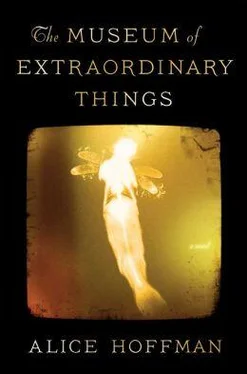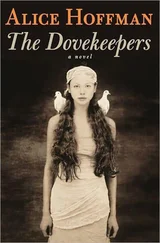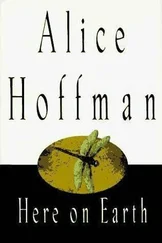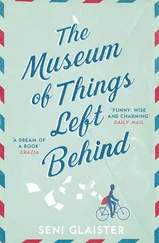“Oh, hush up yourself,” Agnes said. “They don’t give a damn about us, and Miss Juliet always did.”
Sarah was chalk white. I realized that she was truly frightened, for she looked over her shoulder, anxious that they might be spied by a member of the Block family. “I won’t be party to this,” she declared. She turned and left us there in the park.
“Don’t worry about her. Sarah won’t say anything,” Agnes assured me. “She’s afraid of her own shadow.”
We sat on a bench. It was a warm night and the park was crowded. The people here were different from the throngs downtown. We were far enough uptown for the social classes to be separated. And yet, against the wishes of the creators of this great green place that was meant to remain pristine, it was changing. The meadows had been turned into playing fields by groups of young men from downtown who traveled here to play stickball on hot nights.
As Agnes and I sat together, the dogs were very quiet, though clearly happy to see me. They sat at my feet as if they were my own.
“Would you think of taking them?” Agnes asked. “No one gives a damn about them either, and, forgive me for saying so, Miss Block hated them.”
The dogs gazed at me beseechingly. They looked like fools in their clipped haircuts. I wanted nothing less than these silly beasts.
“They’re Jasper and Antoinette,” Agnes went on. “Poor things. They’re ignored in the house, and I suspect that in time they’ll be ill treated. If you have anything like a heart, you’ll take them.”
To placate her I said that at some point I might consider it; perhaps I would take them away once my own life was more settled. I most likely did not mean this, but I had reason to strike a bargain, for I needed something in return: to see Harry. I asked Agnes if she would let me into the town house, and to my surprise she agreed most readily.
“For Miss Juliet’s sake,” she told me. “Since you were her friend and she was mine.”
Agnes was a young, cheerful girl from Ireland, and she resented the way the household help were treated; the saving grace of working for the family had been Miss Block, who regarded the maid as she might have a younger sister. We walked back together and went round the rear of the building. It was paved with cobblestones, and there was a large metal case for the milkman to deposit cream and cheese in the mornings. Agnes unlocked the door that allowed me into the house. She would wait for me on the corner of Sixty-third Street with the poodles until my business was done so she would not be thought to be associated with me in any way. I went through the empty kitchen—larger by ten times than the room my father and I had lived in—and found my way along the corridors, tiled with dark marble that was veined with pink and gold. There was a small sitting room, decorated for ladies, in tones of green and rose.
I continued on to the main hallway, which was shaped like a teardrop, and stood beneath the Tiffany chandelier, steadying myself. Agnes had informed me that the elder Mr. Block was ill and rarely left his bed. Mrs. Block had gone out to a party. Mr. Harry Block would likely be found in the study, for he’d slipped into a state of melancholy ever since his sister had run away. That was where I found him, practicing his chess game with an imaginary partner. I came into the study and closed the sliding walnut doors behind me. Block raised his eyes, and there was a flicker of fear. Perhaps he thought he was about to be robbed, as he had been all those years ago.
“Did Frank Herbert play chess with you?” I asked. “Because he’ll be unavailable to do so for the next twenty years.”
My enemy recognized me and nodded, as if we were old friends.
“Herbert was too much of an imbecile to understand the intricacies of chess. It was Juliet who played a good match.”
I sat down in one of the green velvet chairs. “And yet you were willing to send her off to a hospital for her political views.”
Block glared at me, confused as to how I would gain access to such information. “I would never have brought any harm to my sister if that’s what you’re insinuating. She was placing herself in danger by her choice of companions and activities. She would have soon found herself in jail. I wished to protect her.”
“Now she’s run away from your protection. For her sake I hope she’s found some freedom in doing so.”
“What business is my family to you?”
I was not the man to explain to him how deeply all of the workers had been influenced by the families that had employed them. Nearly every aspect of our daily lives had been affected by people who never knew our names. I picked up one of the chess pieces. It was the queen. “I never had time for games,” I said. “Never learned chess. I was working from the moment I was able.”
“You played the thief quite well.”
“And it seems you played the murderer.”
Block flushed with anger. “That had nothing to do with me. I didn’t tell Herbert to kill her. I never would have. I simply said to scare her off. He didn’t know when enough was enough and took it upon himself.”
“I think the Workmen’s Circle will take it upon themselves to watch you carefully. If you have business dealings that are questionable, if you cover up practices that place workers in danger, it’s likely they’ll know. I think you’ll find yourself spending a good deal of time in court from now on. Good thing you’re an attorney.”
I reached into my waistcoat pocket for the watch. I had not realized the weight of it until that moment. My future had nothing to do with the time it told, nor did it define who I’d been in the past. I placed it on the game table.
“Do you think you returning my own property to me makes you an honest man?” Block asked.
“I think it makes me a man. I’m not sure you can say the same.”
Before I left my old enemy, I took a last look at the watch I had carried for so long. It had never seemed like mine. Whether I was honest or not, I was free from its burden. I went out of the town house and met Agnes on the corner. We walked together speaking of Juliet, who was at that very moment on her way to California. We took the dogs into the park. Mr. Block kept them locked up in the kitchen; because he’d bought them for Juliet he despised them now. I let them off their leashes for once. As it turned out, broken or not, it appeared I had a heart.
THE STABLE was empty, although several of the liveryman’s pigeons managed to find their way in through gaps in the wooden siding to take shelter for the night. Eddie had taken to spending time in this gloomy place with both Mitts and North, breathing in the scent of hay, remembering how he had come here as a boy and slept beside the horses. After one tiff, when Mitts approached the wolf in an overly friendly fashion, the two got on well enough, if ignoring one another meant there was an uneasy peace. Eddie’s hand was still wrapped, but the pain had eased. He supposed the bones were mending. His heart, however, was not in a similar condition, precisely the problem with having such an organ, for it caused pangs of desire and regret, reminding an individual that he was indeed human, prone to human sorrows and desires.
Eddie had reverted to his old insomniac’s habits, avoiding sleep for as long as possible, existing on a diet of coffee and gin. When he did close his eyes, whether dozing in a chair or resting his head against the stable wall, Coralie came to him in his dreams. She was in the river, in his bed, out of reach and leaving him in a fevered and dejected state. He’d memorized several lines from the note she’d written him. I do not love you and cannot pretend to. I am promised to a man in France, a family friend, and it is to him I now go. Please do not follow me. Forget me if you can.
Читать дальше












